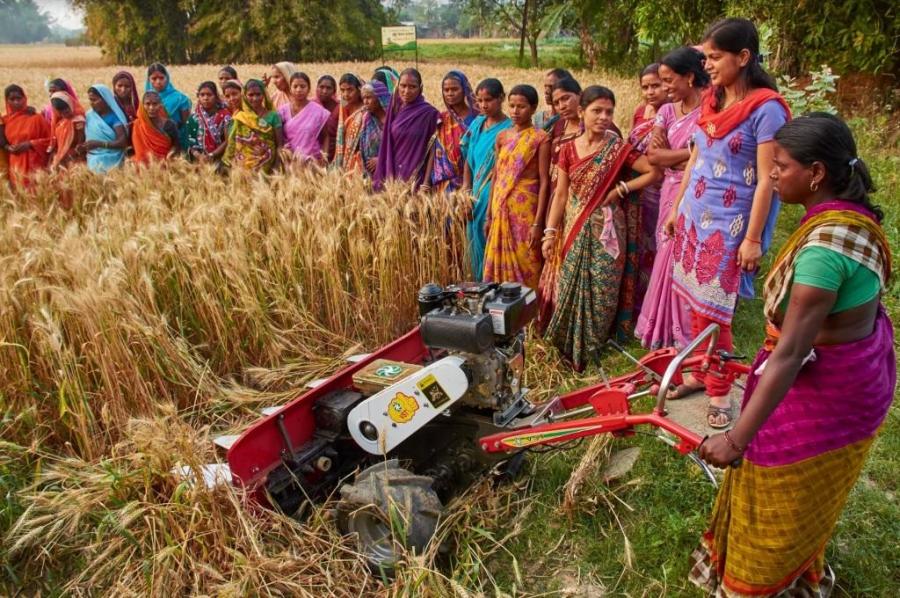Women Farmers’ Day is a significant occasion in India, aimed at celebrating the crucial roles women play in agriculture. This day emphasizes the need for recognition and support for women farmers, who often face challenges in accessing resources and opportunities. There is a need for government and corporate interventions that can support rural women farmers in generating a sustainable livelihood through agriculture.
An initiative that stands out in this regard is ITC’s Climate Smart Agriculture (CSA) program wherein women are not only recognized for their efforts but are also equipped with the tools and knowledge to thrive in their agricultural pursuits. The program focuses on making agriculture regenerative, productive, sustainable, remunerative, and climate-resilient. This aligns with the Indian Government’s programs, such as PM KUSUM, which aim to improve farmer incomes and minimize climate-related risks.
Mukta Thakre, a women farmer and Krishi Sakhi, Sayat Amravati says “Adopting climate-smart agriculture practices like broad bed furrow, improved seed varieties for Soya, and diversifying alternate livelihood into animal rearing, poultry, and vermicelli business has transformed my life. Now I earn up to ₹6 lakh annually; out of which ₹4 lakh annually is from farming and an additional ₹2 lakh is from other activities. As a Krishi Sakhi, I am proud to support 80-85 women farmers in our community through Farmer Field Schools to increase their income through these sustainable agriculture and allied climate smart practices.”
Women in rural areas are particularly vulnerable to the impacts of climate change compared to their male counterparts. Recognizing this, ITC has implemented several targeted initiatives:
Building Capabilities: ITC focuses on enhancing the capabilities of women farmers through exclusive Farmer Field Schools. These schools have nurtured 1.95 lakh women Climate Smart Farmers, training them to adopt climate-resilient agricultural practices tailored to region-specific crops, aiding in adaptation to changing weather patterns.
Women Agri Business Centres: ITC has established 349 Women Agri Business Centres to help women organize and coordinate equipment procurement and engage in group business enterprises such as nurseries, seed production, and coco peat production.
Public-Private Partnerships: Exclusive partnerships with government entities aim to strengthen the livelihoods of women agriculturists. For instance, a recent collaboration with the Tribal Cooperative Marketing Development Federation of India (TRIFED) focused on improving the livelihoods of organic turmeric farmers in Andhra Pradesh and Odisha, training 3,400 women farmers in the first season. Similar initiatives have been launched with the Rajasthan government and the State Rural Livelihood Missions of Maharashtra and Bihar.
Livelihood Diversification: ITC promotes livelihood diversification for rural women, particularly in small ruminants like goat and sheep cultivation, where women are more actively engaged. Additionally, 1,043 Women Pashu Sakhis have been trained to provide livestock services, benefiting over 1.15 lakh households.
Support for Women-headed Households: The program also specifically targets 36,900 women-headed households living in extreme poverty, helping them pursue farm and non-farm livelihoods, such as petty shops and livestock rearing.
ITC promotes Women Climate Smart Farmers by building their capabilities and helping them adopt climate-smart practices. During the 2023-24 period, the intervention covered 1.95 lakh women farmers across 19 states through 755 exclusive Women Farmer Field Schools (FFS). Women collectives have been established to facilitate self-help and entrepreneurial activities, leading to the formation of 349 Women Agri Business Centres (ABCs) and Women Farmer Producer Organizations with nearly 7,000 members. These initiatives have enabled rural women to successfully run group enterprises, including nurseries and agri-equipment hiring.
Moreover, women are encouraged to take leadership roles in committees related to agriculture and allied activities, such as Water User Groups and plantation committees (Vannikaran Sanghas).
Women Farmers’ Day serves not only as a celebration of the significant contributions of women in agriculture but also as a call to action to continue supporting and empowering them, ensuring a brighter and more equitable future for all women farmers across India.
(Note: The information in this article is provided by ITC Ltd.)













.jpg)



